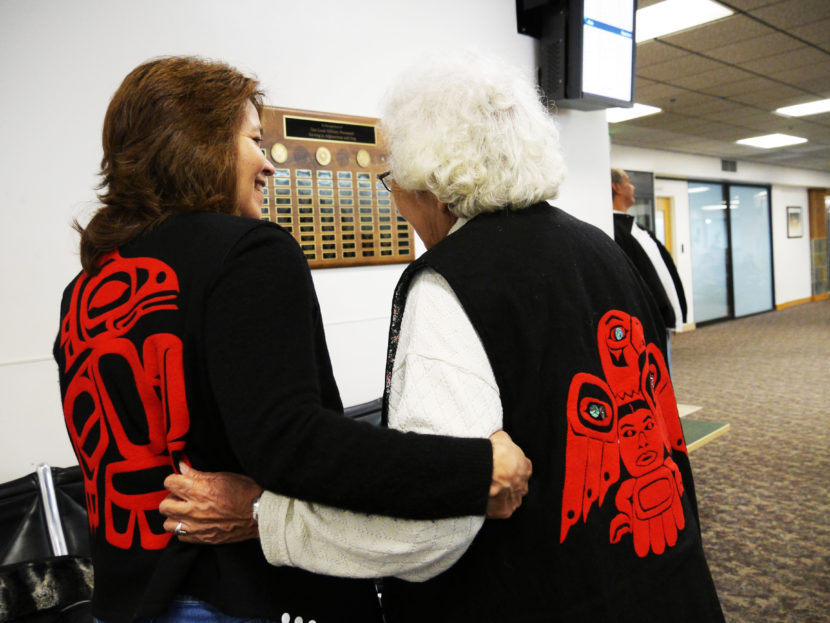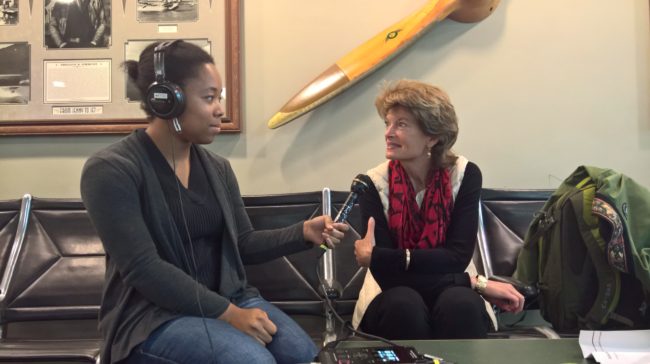
Hundreds of people gathered Thursday at Glacier Bay National Park and Preserve to celebrate the opening of a newly completed Huna Tribal House and the National Park Service’s 100th anniversary.
Not everyone could make it. Some event speakers and tribal members — including me — got stuck at Juneau International Airport because of fog near the park. But that didn’t stop us from watching the event from afar.
Two decades in the making, the Xunaa Shuká Hít, which roughly translates to Huna Ancestor’s House, celebrates the four major Huna Tlingit clans that lived in the area that became Glacier Bay National Park and Preserve. According to the park service, villagers fled an advancing glacier hundreds of years ago. Clan members couldn’t return to area because it was taken over by the National Park Service in the 1980s.
But as the fog cleared Thursday morning, and tribal members paddled to the shore in newly carved canoes, Glacier Bay called its people back to their homeland.
Planes traveling to the area weren’t able to land. About a dozen people leaving from Juneau couldn’t attend and Republican U.S. Sen. Lisa Murkowksi was one of them.

“We are sitting here waiting for the fog to lift in Gustavus, along with a fair number of Alaskans who are hoping to go out, to be part of the celebration,” she said.
She was hoping to catch a late morning flight, but it didn’t work out. At that point, the terminal’s only television was tuned to live coverage of the event.
The last time Murkowski was in Gustavus was in 2012. Officials were trying to break ground for the tribal house.
“I saw the details and the plans,” she said, “I was really looking forward to being able to see it ‘live and in color,’ as they say. So maybe we’ll yet get out there today, but it remains to be seen.”
Across the lobby, Bert Frost sat with a couple of his colleagues. He’s the regional director for the National Park Service in Alaska. He said it’s an important part of American history — and this event emphasizes that Alaska Native history is a part of that.
“A lot of people don’t understand that there’s a Native tie to those lands,” Frost said, “it wasn’t just created in 1917. This is the homeland for the Huna Tlingit.”
He hopes that the tribal house will help rebuild the relationship between the tribal community and the National Park Service.
“We always haven’t had a great relationship with the Native people,” he said. “So through this effort of building this tribal house and the things it represents to the Huna Tlingit and the National Park Service, is the coming together for all of these entities.”
Adrienne Fleek also works for the park service as the Alaska Native Affairs liaison.
“There’s a really big commonality between the mission of our organization, of preserving and protecting special places in America for future generations,” Fleek said, “with the Alaska Native way of being, of preserving and protecting our resources.”
She’s planned to meet up with family at the ceremony and is dressed for the occasion.
“I have a traditional Tlingit vest on,” Fleek said. “On the back it is a Raven emblem and on the front is Coho. Traditionally when you go to a ceremony, you wear regalia to show who your family is.”
And she wasn’t the only one sporting regalia.
Around the corner, Lillian Austin is watching a livestream of the event. She’s wearing a traditional black vest, with her tribe’s Thunderbird stitched on the back — one of the four big clans from Glacier Bay.
“It’s pretty good, that building there,” she said. “It took them five years to do this building, it’s got all of the different clans’ designs, we’re Thunderbird.”
Austin is a tribal elder who grew up in Hoonah, and spent summers in Glacier Bay as a child. Her nephew, Herb Sheakley, is one of the carvers for the project.
As of Thursday afternoon, she was still waiting for reliable transportation to the event.
Austin said like everyone else in limbo at the airport, she was excited and hadn’t seen the tribal house.
If the weather permitted, it would be the first time she’s visited Glacier Bay in more than 50 years.
